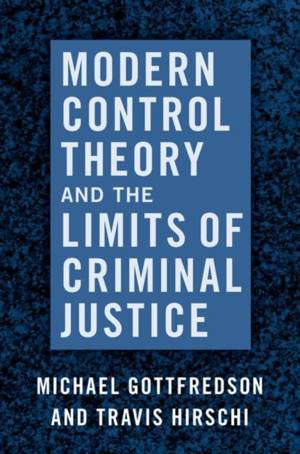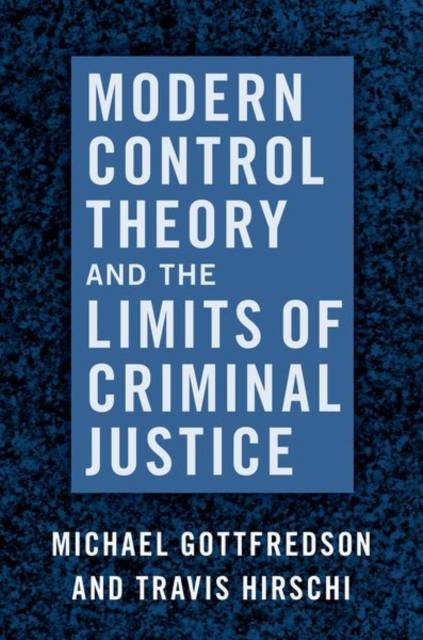
Door een staking bij bpost kan je online bestelling op dit moment iets langer onderweg zijn dan voorzien. Dringend iets nodig? Onze winkels ontvangen jou met open armen!
- Afhalen na 1 uur in een winkel met voorraad
- Gratis thuislevering in België vanaf € 30
- Ruim aanbod met 7 miljoen producten
Door een staking bij bpost kan je online bestelling op dit moment iets langer onderweg zijn dan voorzien. Dringend iets nodig? Onze winkels ontvangen jou met open armen!
- Afhalen na 1 uur in een winkel met voorraad
- Gratis thuislevering in België vanaf € 30
- Ruim aanbod met 7 miljoen producten
Zoeken
Modern Control Theory and the Limits of Criminal Justice
Michael Gottfredson, Travis Hirschi
Hardcover | Engels
€ 139,45
+ 278 punten
Uitvoering
Omschrijving
In 1990 when Michael Gottfredson and Travis Hirschi published A General Theory of Crime, now often referred to as self control theory, it quickly became among the most discussed and researched perspectives in criminology. In Modern Control Theory and the Limits of Criminal Justice, Gottfredson and Hirschi develop and extend the theory of self control advanced in their classic work. Focusing on the methodology of testing crime theory and measuring behavioral research on crime and delinquency, they critically review the evidence about self control theory. Gottfredson and Hirschi further discuss evidence about the positive consequences of higher levels of self control from education, economics, and public health, that-along with evidence from delinquency and crime-show substantial support for the theory of self control. Illustrating the theory through predictions about policing, incarceration, juvenile justice, and the connection of immigration policy to crime, this book connects
self control theory to the structure and function of the criminal justice system, then applies the theory to pressing issues of public policy about delinquency and crime.
self control theory to the structure and function of the criminal justice system, then applies the theory to pressing issues of public policy about delinquency and crime.
Specificaties
Betrokkenen
- Auteur(s):
- Uitgeverij:
Inhoud
- Aantal bladzijden:
- 296
- Taal:
- Engels
Eigenschappen
- Productcode (EAN):
- 9780190069797
- Verschijningsdatum:
- 1/11/2019
- Uitvoering:
- Hardcover
- Formaat:
- Genaaid
- Afmetingen:
- 162 mm x 245 mm
- Gewicht:
- 595 g

Alleen bij Standaard Boekhandel
+ 278 punten op je klantenkaart van Standaard Boekhandel
Beoordelingen
We publiceren alleen reviews die voldoen aan de voorwaarden voor reviews. Bekijk onze voorwaarden voor reviews.











